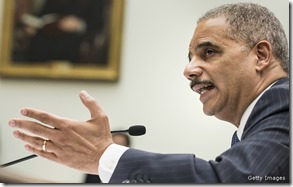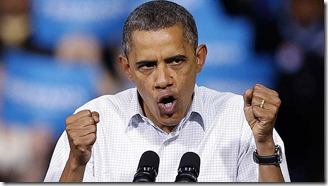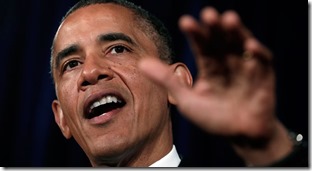“Law is defined to be a rule of action; but how can that be a rule, which is little known and less fixed?” — James Madison, Federalist No. 62 — 1788
When writing about the tyranny of a mutable government and the legislature passing long and complicated laws of which no one could comprehend and obey James Madison raises the very forceful point. He stated that citizens will find it very difficult to obey the law if it is constantly changing (“mutable government”), either by growing enormously in size to be beyond the grasp ordinary people, or by being incoherent, or being repealed or revised before they are promulgated.
Today we have the situation where massive and complicated laws, like ObamaCare (over 3,000 pages) are passed without having been read or debated by the legislators themselves, let alone discussed in the press and by the people. When this sad state has been reached, the law itself, as Madison eloquently says, “poisons the blessings of liberty.” James Madison stated in Federalist No. 62:
“To trace the mischievous effects of a mutable government would fill a volume. I will hint a few only, each of which will be perceived to be a source of innumerable others.
In the first place, it forfeits the respect and confidence of other
nations, and all the advantages connected with national character. An individual who is observed to be inconstant to his plans, or perhaps to carry on his affairs without any plan at all, is marked at once by all prudent people, as a speedy victim to his own unsteadiness and folly. His more friendly neighbors may pity him, but all will decline to connect their fortunes with his: and not a few will seize the opportunity of making their fortunes out of his. One nation is to another, what one individual is to another; with this melancholy distinction perhaps, that the former, with fewer of the benevolent emotions than the latter, are under fewer restraints also from taking undue advantage of the indiscretions of each other. Every nation, consequently, whose affairs betray a want of wisdom and stability, may calculate on every loss which can be sustained from the more systematic policy of its wiser neighbors. But the best instruction on this subject is unhappily conveyed to America by the example of her own situation. She finds that she is held in no respect by her friends; that she is the derision of her enemies; and that she is a prey to every nation which has an interest in speculating on her fluctuating councils and embarrassed affairs.
The internal effects of a mutable policy are still more calamitous. It poisons the blessing of liberty itself. It will be of little avail to the people, that the laws are made by men of their own choice, if the laws be so voluminous that they cannot be read, or so incoherent that they cannot be understood; if they be repealed or revised before they are promulgated, or undergo such incessant changes that no man, who knows what the law is to-day, can guess what it will be to-morrow. Law is defined to be a rule of action; but how can that be a rule, which is little known, and less fixed?
Another effect of public instability is the unreasonable advantage it gives to the sagacious, the enterprising, and the moneyed few over the industrious and uniformed mass of the people. Every new regulation concerning commerce or revenue, or in any way affecting the value of the different species of property, presents a new harvest to those who watch the change, and can trace its consequences; a harvest, reared not by themselves, but by the toils and cares of the great body of their fellow-citizens. This is a state of things in which it may be said with some truth that laws are made for the FEW, not for the MANY.
In another point of view, great injury results from an unstable government. The want of confidence in the public councils damps every useful undertaking, the success and profit of which may depend on a continuance of existing arrangements. What prudent merchant will hazard his fortunes in any new branch of commerce when he knows not but that his plans may be rendered unlawful before they can be executed? What farmer or manufacturer will lay himself out for the encouragement given to any particular cultivation or establishment, when he can have no assurance that his preparatory labors and advances will not render him a victim to an inconstant government? In a word, no great improvement or laudable enterprise can go forward which requires the auspices of a steady system of national policy.
But the most deplorable effect of all is that diminution of attachment and reverence which steals into the hearts of the people, towards a political system which betrays so many marks of infirmity, and disappoints so many of their flattering hopes. No government, any more than an individual, will long be respected without being truly respectable; nor be truly respectable, without possessing a certain portion of order and stability.”
In Federalist Paper 10, probably the most important of the Federalist Papers, James Madison, writing as Publius, addresses the Tyranny of the Majority trough Factions.
“Complaints are everywhere heard from our most considerate and virtuous citizens, equally the friends of public and private faith and of public and personal liberty, that our governments are too unstable, that the public good is disregarded in the conflicts of rival parties, and that measures are too often decided, not according to the rules of justice and the rights of the minor party, but by the superior force of an interested and overbearing majority. However anxiously we may wish that these complaints had no foundation, the evidence of known facts will not permit us to deny that they are in some degree true.”
As I have stated in previous blogs in 2007, Congress enacted 138 public laws, while federal agencies finalized 2,926 rules, including 61 major regulations.” In this context, it is irrelevant who resides in the White House or holds the House speaker’s gavel. America is not a nation of laws, but of rules. Only a renewed cultural will to true reform, coupled with political leadership, can correct that.
Today we are experiences the worst of our Founder’s fears. An unfettered executive branch coupled with a legislative branch that is so encumbered with factions that it no longer serves the will of the people. This combination of ills has formed a fourth branch of government — the administrative state.
I have written numerous times about the history and tyrannical effects of the administrative state and how it is slowly destroying the republic our Founders envisioned. The latest egregious example is the Senate passed 1,200 page immigration bill that contains so much pork a pig farmer would have problems weighing it. It contains cars for immigrants to placate Senator Barry Sanders of New Hampshire and subsidies for the Alaskan fishing industry. It states that the counterfeiting of no more than three U.S. passports is not a crime. While allowing for the hiring of 20,000 additional border patrol agents and building a fence along the entire border it gives the Department of Homeland Security the power to cancel the fence construction at any time at their discretion.
Today a landmark Supreme Court ruling that struck down a key part of the Voting Rights Act has set up a stand-off between Republican-led states and the Obama administration over controversial voting laws that until now had been stalled.
The 5-4 ruling on Tuesday addressed a 1960s-era provision that largely singled out states and districts in the South — those with a history of discrimination — and required them to seek federal permission to change their voting laws.
The court ruled that the formula determining which states are affected was unconstitutional.
In doing so, the court potentially opened the door for certain states to proceed with voter ID laws and other efforts that to date had been held up because of the Voting Rights Act. Prominent among those are voter identification laws in Alabama and Mississippi.
Yet Attorney General Eric Holder has claimed that he does not agree with the ruling and will continue to do all he can to force states to abide by his edicts
ruling and will continue to do all he can to force states to abide by his edicts
Attorney General Eric Holder warned states against going too far. He said the Justice Department would not hesitate to take "swift" action against states looking to "take advantage" of the ruling.
He, like President Obama, said he was "deeply disappointed" in the decision, saying discriminatory practices live on and need to be addressed.
"These problems have not been consigned to history," Holder said.
Holder and Obama urged Congress to create a new formula.
"Today's decision invalidating one of its core provisions upsets decades of well-established practices that help make sure voting is fair, especially in places where voting discrimination has been historically prevalent," Obama said.
To read more on this decision click here.
In another example of the power of the administrative state today Obama declared his war on coal even though throughout the 2012 election campaigned he denied such a war on coal or guns.
So much for the denials. An administration that throughout its 2012 election campaign denied it was waging a War on Coal has now come out and publicly declared its intention to shut down coal-fired power plants – putting hundreds of thousands of Americans out of work and sending electricity prices skyrocketing.
This is not what the American people voted for.
Responding to a White House petition to end the War on Coal, the administration said: “The President has made clear that he understands that coal has played a critical role in our country’s energy portfolio for decades and will continue to be an important source of energy in the future.”
Sycophantic liberal media outlets (like The Nation and the Associated Press) went further, repeatedly claiming that the War on Coal was a myth. The Obama campaign even ran a TV ad in Ohio claiming that Mitt Romney would be bad for coal – and trotted out former Democratic Gov. Ted Strickland to deny there was a war on coal and echo the attacks on Romney.
Yet today Obama political consultant David Plouffe took to Twitter to bang his chest: “Today's climate announcement underscores that elections matter greatly” – as if Obama had campaigned on shutting down coal plants instead of on denying his intention to do so.
Such denials are no longer necessary. Today a top Obama global warming adviser told The New York Times the denials were just election-year politics. Daniel Schrag said: “Politically, the White House is hesitant to say they’re having a war on coal. On the other hand, a war on coal is exactly what’s needed.
And Obama delivered. It’s right there on page 19 of his Climate Action Plan: “Going forward, we will promote fuel-switching from coal to gas for electricity production.”
Indeed, Obama made clear in his speech that he intends to impose regulations on existing coal plants that can only be met through carbon capture and storage (technology that doesn’t exist on a commercial scale), switching to natural gas, or shutting down completely.
Coal still produces 37 percent of U.S. electricity. A Heritage Foundation analysis found that implementing Obama’s proposed regulation on existing coal plants would destroy more than 500,000 jobs, slash the income of a typical family of four more than $1,400 a year, and increase electricity prices at least 20 percent. Price spikes could be much higher in states that depend heavily on coal-fired power plants, especially in the Midwest. President Obama once famously explained that he intended to make electricity prices “necessarily skyrocket.”
Obama intends to fight his War on Coal by issuing a Presidential Memorandum to the EPA to issue regulations under the 1970 Clean Air Act. This is despite the fact that the law’s principal author, Democrat John Dingell of Michigan, famously said: “This is not what was intended by the Congress and by those of us who wrote the Clean Air Act. We are beginning to look at a wonderfully complex world, which has the potential for shutting down or slowing down virtually all industry and all economic activity and growth.”
Memorandum to the EPA to issue regulations under the 1970 Clean Air Act. This is despite the fact that the law’s principal author, Democrat John Dingell of Michigan, famously said: “This is not what was intended by the Congress and by those of us who wrote the Clean Air Act. We are beginning to look at a wonderfully complex world, which has the potential for shutting down or slowing down virtually all industry and all economic activity and growth.”
And there is zero global warming benefit to go with all the economic costs, because even if all United States greenhouse gas emissions were shut down to zero tomorrow, the rest of the world would keep on puffing. Paul Knappenberger recently calculated, based on standard assumptions, that getting to zero emissions in the U.S. immediately would only reduce global average temperatures an imperceptible 0.08 degrees Celsius by 2050. Moreover, the rest of the world would replace all U.S. emissions within seven years.
So it’s all pain and no gain — by legally dubious means — to accomplish the opposite of what Obama promised on the campaign trail. Congress should take exception to being circumvented and step in to stop Obama’s (now-declared) War on Coal.
Once again it is plain to see that complex laws passed by a willing legislature leave the door open for the executive branch to do just about anything it wants under the color of law. This is truly a feature of the administrative state where the masterminds call the shots and self-government is a thing of the past. So much for the Republic Mr. Franklin.
On the other hand 62 Tea Party representatives dealt a blow to the Republican leadership of the House of Representatives when they gather enough support to defeat an overblown Farm Bill on June 20th.
The GOP leadership suffered a stunning defeat as 62 Republicans voted against the 5-year farm bill (H.R. 1947), which locks in the record baseline of food stamp spending and creates multiple new agriculture subsidy programs. A handful of them voted against it because it cut too much spending, and others like Bill Shuster voted no because they are facing potential primary challenges (Shuster voted for the 2008 bill). But this is a strong showing, as it is a dynamic none of us would have ever predicted several years ago.
Some Republicans are complaining that because of the conservative revolt we will now continue on the status quo with direct farm subsidies. But they fail to understand that the new price support programs and shallow loss coverage that were created by this bill would have been more expensive and represent worse market distortions than direct subsidies. It’s better to reauthorize the status quo than to pass a long-term bill that creates even more problems and precludes real reforms for another 5 years.
Other Republicans complain that now we will face the so-called milk cliff. Pursuant to a silly 1949 act of Congress, every time we fail to renew expiring farm programs, the government must begin imposing Soviet-style price controls on milk by decreasing supplies through massive purchases of milk, butter, cheese, and other dairy products. Under permanent law, the USDA would begin purchasing dairy products at a rate of $38.54 per hundredweight; more than double the current price ($18 per hundredweight). This market manipulation could double the price of milk, dairy products, and everything else up the food chain.
![]() But instead of avoiding the deleterious effects of the Agriculture Act of 1949 by growing government, why don’t we just repeal the damn law?
But instead of avoiding the deleterious effects of the Agriculture Act of 1949 by growing government, why don’t we just repeal the damn law?
In a sane world, both houses of Congress would convene and repeal this inane and outdated law within a few minutes by unanimous consent. That way we could debate a long-term farm bill without having the sword of the 1949 law brandished over our necks and forcing Congress to rush through bad legislation.
However, Congress is not sane, and they have no plans to repeal the law. In fact, Paul Broun introduced an amendment to do just that, but all the Democrats and more than half of Republicans voted it down.
The latest ephemeral trend in Washington is to create a contrived crisis for the purpose of growing government, increasing spending, or raising taxes. The new “milk cliff” is just the latest in the bag of tricks held by the permanent statist class.
Moving forward, we must split up the farm bill into two components; food stamps and agriculture programs. Food stamps must be devolved to the states and most agricultural subsidies need to be means-tested and charted on a gradual course towards elimination. And most of all, the dairy supply control system must be repealed once and for all in a standalone piece of legislation.
That would represent responsible conservative reform that is becoming of a GOP-controlled House. Working harder to buy off Democrats with more spending increases is not the way forward. If Kevin McCarthy and Eric Cantor desire to grow government with Democrat support, maybe they should run for the Pelosi whip team.
The American people elected a Republican House to provide a bold contrast to the Obama-Pelosi agenda, not to work behind the scenes to help grow government with their support.
You can read more about the defeat of the trillion dollar food stamp and farm bill by clicking here.
One of the things all tyrannical regimes such as the administrative state does is to compile a list of enemies. These enemies are defined as those who do not agree with their policies and could pose a threat to their agenda.
The vast majority of the annual shooting homicides are committed by inner-city and minority youths below the age of 30. Handguns are involved in 80% of all murders. Rifles and shotguns account for less than 10% of homicides.
No matter; the National Rifle Association is now blamed for generic gun violence, especially the mass shootings at schools, even though usually no one knows of any proposed gun law — barring outright confiscation of previously purchased firearms, bullets, and clips — that would have prevented the shooters at Sandy Hook and Columbine. Gun merchants are blamed by the president while in Mexico for selling lethal semi-automatic weapons to drug cartels. But so far, the only identifiable purveyor of illegal weaponry is the president’s own attorney general, whose subordinates in the Fast and Furious operation sold hundreds of guns illegally to Mexican drug lords.
Suggestions to encourage greater incarceration of the mentally unstable, to jawbone Hollywood about its profitable (and gratuitous) gun violence, to regulate extremely violent — and extremely well-selling — video games usually fall on deaf liberal ears. In short, the stereotyped camouflaged, weekend gun enthusiast is not the problem that leads to Columbine, or the nearly 532 murders last year in Chicago. But because we can’t or won’t address the causes of the latter, we go after the former. He is not the unhinged sort that shoots a Gabby Giffords or innocents in an Aurora, Colorado, theater; but somehow is the supposed red-neck yokel that a journalist like ABC’s Brian Ross assumes does.
If the Department of Homeland Security, as is rumored, really did wish to stockpile hundreds of millions of rounds of ammunition, then why did it begin such repository buying right in the middle of a hysterical national debate about limiting access to various rifles and semi-automatic weapons? Was it not to create a climate of fear and panic buying that has emptied America’s shelves of the most popular types of ammunition? If the homicide rate in Philadelphia and Chicago is any indication, murderers still have plenty of access to bullets. Those who want to target practice or shoot a varmint on their property do not.
The CIA and FBI knew of the suspicious activity of the Boston bombers, of Major Hasan, and of Anwar al-Awlaki. And they did nothing to preempt their violence. The FBI is said to be carefully avoiding monitoring mosques, although all of the above terrorists were known by many fellow Muslim worshipers to be either disturbed or extremist or both. In contrast, the NSA monitors, we are told, nearly everyone’s communications rather than focusing on Middle Eastern male Muslims, even though Middle Eastern male Muslims have been involved in the vast majority of post-9/11 terrorist plots. The NSA is the electronic version of the TSA, which feels it is noble and liberal to stop an octogenarian in a wheel chair for special frisking as proper compensation for every focused look at a West Bank resident or Pakistani visitor on his way into the United States.
The words “Tea Party” and “patriot” in a non-profit’s name would more likely earn a negative appraisal from the IRS than would “Islam” or “Muslim.” One wonders how Lois Lerner’s IRS division would treat a hypothetical “Sarah Palin Foundation” versus “The Dr. Zawahiri Charity.”
The IRS is not worried at all about 47% of the nation who pay no federal income taxes. The vast majority of those whom it focuses on are instead the 10% who pay over 70% of all taxes. These are the would-be proverbial “fat cats” who did not build their own businesses. They are reluctant to spread their wealth. They certainly did not know either when to stop making money or when the age of profit altogether had passed. Sometime around 2009 success was deemed failure, and failure success — at least if we collate the president fat-cat rhetoric with the vast expansion in the disability, food-stamp, and unemployment-insurance rolls.
Note that the IRS is not interested in leaking to Democrat senators or former administration official rumors about George Soros’s income or the details of the tax returns of Warren Buffett, Steven Spielberg, or Bill Gates. Instead, the Democratic majority leader in the Senate bragged that he knew (falsely as it turned out) that Mitt Romney paid no income taxes. And former high administration official Austan Goolsbee claimed (also falsely as it turned out) that he too knew that the Koch brothers were shorting the IRS.
Note that only liberal groups like ProPublica leak information about the confidential donor lists of conservative activists, apparently given their familiar arrangement with the IRS. So far IRS chiefs are not looking at prominent Democrat politicians for tax violations, although for a time — cf. Tim Geithner, Tom Daschle, Hilda Solis — that might have been a fruitful profile for inquiry. (One encouraging side note: if you are a suspect white, mature, well-off, conservative, heterosexual, Christian male, you can still obtain exemption from federal suspicion by loudly announcing that you also are enthralled by Barack Obama.)
We know who was not an administration suspect in the killing of four Americans in Benghazi — hard-core, al Qaeda-related Islamic terrorists. Instead a supposedly right-wing unhinged video-maker was the object of vitriol from the secretary of state, the UN ambassador, and the president of the United States. He currently sits in jail. The known perpetrators of the murders walk free. In contrast, Lisa Jackson, the former EPA director, just got a fat inside job from Apple, despite creating not just a fictitious name (e.g., “Richard Windsor”) to avoid scrutiny when she communicated official business, but also an entirely made-up alter ego: “Richard Windsor” became an ideal employee lauded by the unethical EPA for his supposedly “ethical behavior.”
We also know who in the media is not a target. Not the CBS or ABC News presidents who have siblings working in the White House. Not ABC’s Good Morning America, given that one of its stalwarts is married to Press Secretary Jay Carney. Instead, there are two sorts of suspicious reporters that are considered hostile to the administration and worthy of having their communications monitored. One group are those journalists who leak information that the administration wished to preempt and leak first or who refuse to only leak favorable classified information — the bin Laden trove, the cyber war against Iran, the drone targeting protocol — that makes the president look as if he were a competent commander in chief.
The other target, of course, is Fox News, whose staff, in a variety of ways and on a number of occasions, the Obama administration has previously attacked as in some way illegitimate.
Again, who fits these profiles that our current, vastly expanding big government does not like? If you are an operator of a coal plant that creates needed energy at a profit, then beware that the EPA is after you. If you are a shady insider who wants tens of millions of government dollars to subsidize a money-losing wind and solar plant, you hit the jackpot. Ditto the suspect people who build guitars, loan money to Chrysler, or wish to locate a jet airliner plant in South Carolina. Profits create suspicion; failures earn subsidies.
Then there are the clingers, whom the president long ago blasted as religious zealots and gun-toting xenophobes. These are the sorts whom the attorney general calls “cowards” (not “my people”) — the “enemies” whom the president advises Latino activists to “punish” at the polls, the sorts that the president apologizes for abroad as guilty of sundry sorts of past class, race, and gender oppression.
In contrast, who is not so worried about government surveillance or audit? The New Black Panthers who turned up at a polling station in Philadelphia to intimidate voters; the “farmers” who, according to the New York Times, filed bogus claims to cash in on the government’s ill-advised and poorly administered Pigford settlement; the Secret Service agents who routinely visited prostitutes while on duty protecting high government officials abroad; and the assistant to Secretary of State Hillary Clinton who used her office to enhance her private consulting business.
Americans wonder whom would the immigration services more likely wish to deport: the German Romeike family that was “guilty” of homeschooling their children; Obama’s aunt Zeituni, who lied about her immigration status to illegally obtain state and federal subsidies; or Onyango Obama, who likewise is here illegally (for 21 years) and was recently charged with ramming a police car while driving intoxicated? Is the U.S. so short of DUI offenders and frauds that we must deport homeschoolers to make room for them?
There is currently a climate of fear growing throughout the United States. Millions of Americans are terrified of the IRS, the Department of Justice, the EPA, U.S. Immigration and Customs Enforcement, and even perhaps the FBI, CIA, and State Department.
Why?
These government agencies have never been bigger, more powerful, and more ideologically driven. Citizens fear them for understandable reasons: those who do nothing wrong, whether in filing tax forms or trying to buy a rifle, are considered suspect and deserving to be the target of either federal scrutiny or presidential slurs. But those who do a great deal of wrong, either by illegally entering the country, disrupting polling, trafficking in weapons in Mexico, eavesdropping on American citizens, pulling tax information for partisan purposes, subverting a government agency, or lying to the public about government activity, seem exempt from punishment — and, more chillingly, sense that they are so exempt.
Ask who now is sitting in prison — a shyster video-maker who had nothing to do with the deaths of four Americans, or their five known terrorist killers lounging about in North Africa? Apparently, Nakoula Basseley Nakoula, like EPA director Lisa Jackson, was guilty of creating a fake persona. Like Labor Secretary Hilda Solis, he had a lien on her business. Like former Treasury Secretary Timothy Geithner, he had some unpaid taxes. Like Tamerlan Tsarnaev, he had been visited by government investigators. Like Attorney General Eric Holder and Director of National Intelligence James Clapper, he lied to federal authorities — although they were not quite as high as those in the U.S. Congress. And unlike all of the above, he was therefore jailed.
Of all the legacies of Barack Obama, the most pernicious will be the creation of a rogue government that has cut off and terrified half the population — and for no other reason than that they seem to represent things that Mr. Obama simply does not seem to understand.
The truth is that governments are always like pitchers trying to pitch out of a jam with all the bases loaded. We the people want a little free stuff. The ruling class wants to seize and hold political power. Promising free stuff is how you get elected. This what James Madison knew when he authored Federalist No. 10.
Usually, those vote-buying promises result in policies that damage the economy. President Obama has been worse than most. The result is that politicians and their officials are always involved in trying to Band-Aid over the distortions and the wounds they have inflicted on the economy and our freedoms in their crude bid for power.










